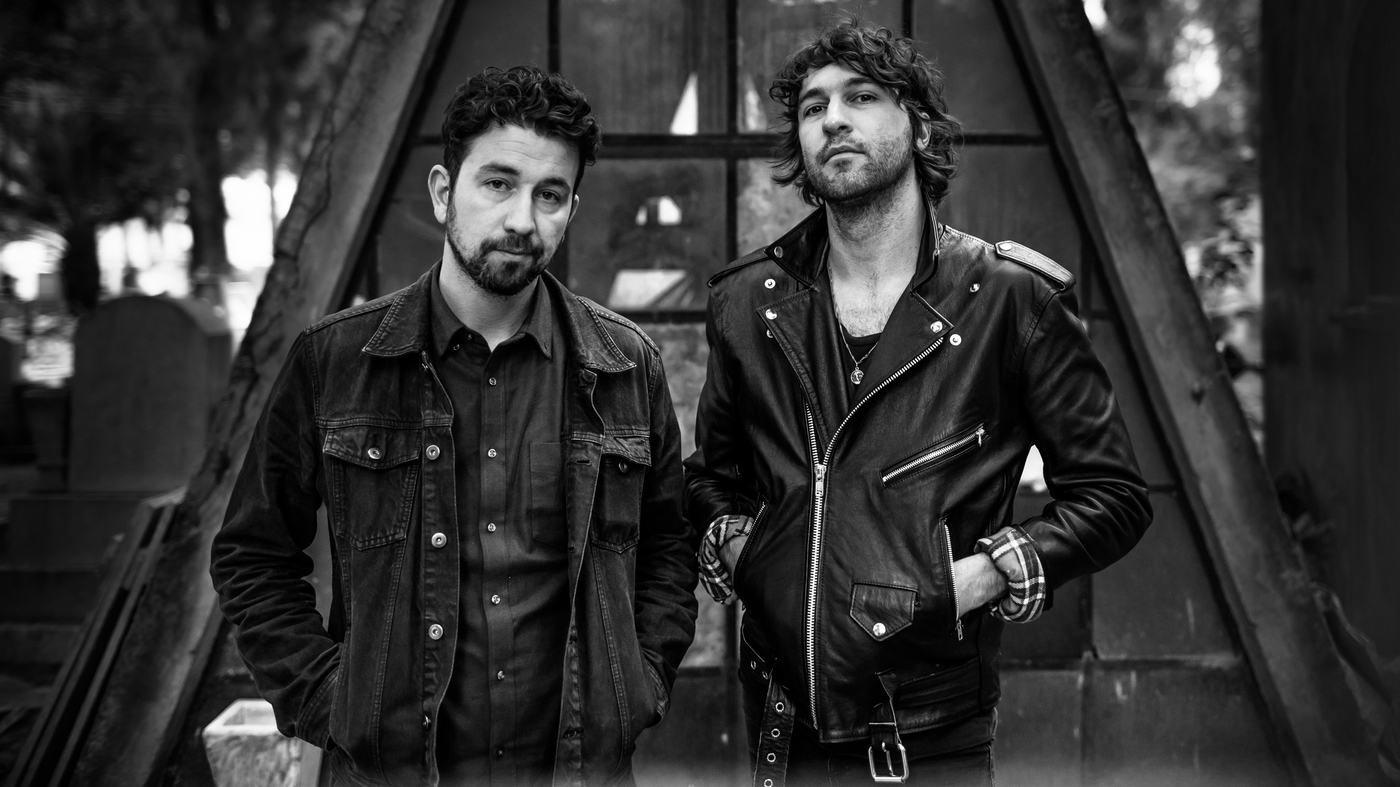Despite the superlatives thrust upon Japandroids and after stripping away the unfairly aimed colossal expectations dumped on these two gentlemen, there exists a single truth that rings with an eerily relevant clarity inside their music: most of us don't want to get older and no one wants to get older alone.
Pay attention to that last word, please: alone. It's a word that rattles our cages and sends us down a terrible, yet completely plausible, path of what ifs. We (myself included) sometimes bristle at the notion that we're uncomfortable being alone, or even that we wouldn't welcome the chance to stand on our own, to live and die by our own self-imposed exile.
But to quote Ian Mackaye, "Yeah, bullshit."
I don't believe that because Japandroids don't believe that. Because the band's appeal and their runaway success, is built on one long consensus of song that distills dow to, "Carpe diem, motherfuckers. For real. No really."
I offer a small lyrical sample for support:
"I don't want to worry about dying/ I just want to worry about those sunshine girls."
"It's raining/ in Vancouver/ but I don't give a fuck/ 'cause I'm in love with you tonight"
"Don't we have anything to live for?/ Well, of course we do/ but until it comes true/ we're drinking"
"Remember that night/ you were already in bed?/ said, 'fuck it'/ got up to drink with me instead?"
"And if they try to slow you down/ tell them all to go to hell"
"Whoa oh oh oh/ whoa oh ooooohh"
But there is nary a set of lyrics where the singers and the songs suggest that perhaps solitude and some good old-fashioned alone time are really what we crave.
Ok, fine. I know. There are plenty of songs where the pronoun "I" gets tossed around pretty liberally. It's the closest indicator we have from the band on self-reliance. Much of Post-Nothing is first person pronoun-centered but utilized in the "royal we" fashion--as in Japandroids are our sovereign nation, "we" are their patriots and together "we" are seizing the day. Maybe not always with each other, maybe not with a tight group friends, and maybe not even with our significant others. But someone--some *body*--is always at our side, or inside their songs, slogging through the depths of memory and sharing the bloom of the present moment. We don't do it alone. When Japandroids sing, we're in this together.
That's right. Sometimes it's us. Sometimes we get to be the ones invited to their party. And, goddamnit, nothing feels better than that sense of belonging, that sense of a shared experience, of a common nostalgia for the tangible, near-universal experiences of "Younger Us" and the softcore hedonism of "The Nights of Wine and Roses." This is what makes Japandroids so good, so very goddamn good. They aren't just a band, they're a unit and a force (or a projection of one). One where no one gets ostracized for the way their nose looks or how their socio-economic status affects their worldview.
In one sense, Japandroids truly manifest the realization of punk rock's dream; no class system, no rules, fuck you, everyone is invited and all are welcome. You don't even need to know the words, just take your cues from the band and the crowd. Fist pump here, singalong chorus, "Whoa oh oh oh," ad infinitum. Everybody get together, try to love one another.
But.
We lived through the first decade of the new millennium. We are all on our guard; we know the circle of inclusion can't last. A band as special, as passionate as Japandroids is destined to make a single, unencumbered move that will piss someone, probably everyone, off and leave us questioning whether what they felt was ever real.
The circle of inclusions tightens a little bit on Near to the Wild Heart of Life. Not because anyone gets ostracized but because the musical brethren of Brian King and David Prowse are finally throwing a party where your significant other, your spouse, or your partner, those forever relegated to the friend-zone, are invited.
It turns out that King and Prowse aren't immune to the politics of love and desire. It just so happens that touring the world for over year, drinking every day, indulging in twenty-something youthful exuberance over and over takes a toll. Eventually, as every protagonist from Luke Skywalker to Elizabeth Benet discovers, the desired outcome leads you to want to return to the place with your bed, to the room with your stuff, and into the arms of the person you love.
Oh God. Our parents might have been right.
Two guys with universal desires that celebrate the bond of humanity with a wall of amplifiers and platform full of floor toms and Shure 57 mics.
Japandroids have always been two guys with universal desires that celebrate the bond of humanity with a wall of amplifiers and platform full of floor toms and Shure 57s. That formula likely won't change no matter how many extra tracks of keyboards, acoustic guitars, and loops, get thrown into the mix inside the studio. And Japandroids definitely will (and have) taken some flak for making guitar lines more defined, the kick drum a little more even-keeled, and the songs a little broader in scope.
Those traits manifest early on the record, as early as the first track, the title track. "Near to the Wild Heart of Life" could be renamed, "The Saga of Japandroids," it's a detailed three-part epic that buzzes heavily around recurring themes the record revisits: self-actualization, the roots of restlessness, music-making as catharsis, drinking as a form of communication, and the discovery of completeness in companionship.
On the surface, these sound like the same old themes the band explored on previous records. What is different is the extent that the focus shifts from one end of the scale to other. Specifically, Near to the Wild Heart is a record almost entirely about the discovery of completeness in companionship.
The songs are more extensive and structured, not longer, per se, though they still keep to the template of eight tracks in one album. Three songs in particular serve as the tentpoles for the album: the first track, "Arc of Bar," and the final track, "In a Body Like a Grave." The album rests its roots on the more experimental structure of these tracks (i.e., experimental for Japandroids) and show how much the band choose to evolve since their debut, ten years ago.
Turns out that non-stop touring will make you quite an effective songwriter and a sharper player of songs.
But the best parts of Wild reside in the "valley" tracks, the tracks littered between the slightly-less-repeatable but still gloriously unfettered "tentpole" tracks. Specifically, "True Love and Free Life of Free Will" and "Midnight to Morning," two songs that point the way toward what the future of Japandroids could hold while remaining utterly faithful to their past and previous records.
"True Love" depends less on the "more is more" inclination of the tentpole tracks and show off musical restraint along with Prowse's dominant drumming, and a lyrical leap from King that doesn't sound or feel like a stumbling block, a quality that mars the title track and "Arc of Bar," ever so slightly. While "Midnight to Morning" is the closest we come to a classic Japandroids track, (it could have easily been situated on Celebration Rock) the raw emotion of "I'm Sorry (For Not Finding You Sooner)," the succinct, clipped verses of "No Known Drink or Drug," and the classic rock hallmark and geographical hopscotch of "North East South West," are all highlights that deserve much, much more than just a passing listen. They're tracks that expand given enough space and room to grow.
Nothing feels better than that sense of belonging, that sense of a shared experience, of a common nostalgia.

Previously, Japandroids have treated every song as a potential anthem and, as it turns out, some were voted in as actual anthems. Wild Heart sounds like a record where the duo approached it knowing that they couldn't sustain that sort of momentum. And they may not have wanted to because of the burn out factor. I love Raw Power, Born to Run, and "We Will Rock You / We Are the Champions" as much as any red-blooded American (or Canadian) can, but even their creators moved on to explore other, bolder territories, rather than linger too long and risk being pigeonholed.
And I can tell that I have already stumbled into that baited trap of wanting the band to sound more like I remember them sounding like, rather than what they sound like now. It's a treat to see these two musicians grow into their skin and become the type of confident, stage-worthy rock stars we so desperately need. And all of their newfound allusions to "true love" and "I've been looking for you my whole life" and the outright proclamation "I'll love you / 'cause you love me" are welcome inclusions for those of us much nearer to the wild heart of 40. I can't ride "North, East, South, West" alongside the band and I don't know where the I-5 is, let along been on it watching yellow lines. But I can live vicariously through their diary travels while singing along in the shower to get pumped for another Tuesday. And, at day's end, I come home, feeling well and like I own true love and free life of free will.
Nothing can replicate the raw fervor of Celebration Rock and the surprising onslaught of Post-Nothing. Near to the Wild Heart doesn't attempt that, thankfully. But it does work on a much higher level than initially credited by using the tried-and-true Japandroids playbook with a trick play or two tossed in. Their previous albums have their place in time and, perhaps, even in the canon. As for Near to the Wild Heart of Life, it is a record of passion, inclusion, and personal, territorial expansion. I'm glad to have it at my side, if for no other reason, than to feel like I'm, once again, invited into their celebratory circle. However old I get.


